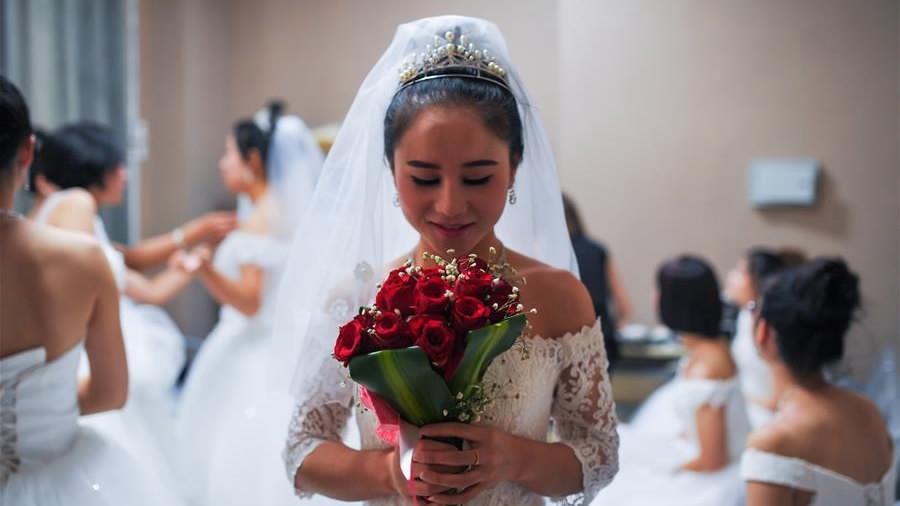A Chinese newspaper has shared its own recipe for a successful marriage with its single female readers: Managing differences with Mr. Right Now instead of waiting for Mr. Right. The advice comes as China witnesses falling marriage rates and climbing divorce cases.
Okay to go for Mr. Okay
An editorial published by Sichuan Daily has made a case for Mr. Okay, telling the single ladies in the country that tolerance – not idolization of love – is the bedrock of a happy commitment.
It argued that one cannot be in a relationship strictly on their own terms.
"Marriage is a process of tolerating each other, and it's impossible that everything goes your way," read the article featured in the regional paper earlier this week.
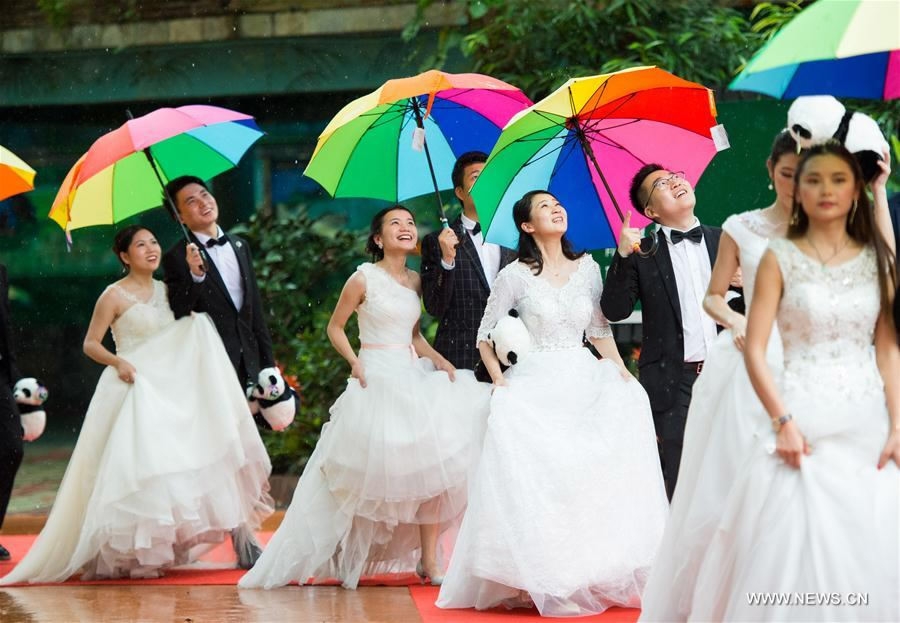
Couples attend a group wedding ceremony at the Chimelong Safari Park in Guangzhou, capital of south China's Guangdong Province, July 8, 2017. /Xinhua Photo
Couples attend a group wedding ceremony at the Chimelong Safari Park in Guangzhou, capital of south China's Guangdong Province, July 8, 2017. /Xinhua Photo
"The ability to compromise on non-principle matters is a sign of magnanimity and contentment".
There are more than 200 million unmarried adults in China, and fewer bachelors and bachelorettes are now willing to tie the knot amid shifting social perceptions towards marriage and
soaring costs of "bride prices".
The crude marriage rate in China has been on the decline after reaching a peak in 2013, when 9.92 marriages per 1,000 people were recorded, according to the Ministry of Civil Affairs. The year 2016 saw 8.3 marriages per 1,000 people, with 11.4 million couples getting hitched, down 6.7 percent from a year earlier.
Loneliness trap
Single men, who already outnumber their female counterparts, are finding it hard to meet rising requirements for betrothal gifts to prospective brides. In cities like Beijing wooing the in-laws could take as much as 200,000 yuan (over 31,500 US dollars) in cash and an apartment as a deal sweetener, according to a report by People’s Daily last year.
Meanwhile, unmarried women are enjoying their financial independence and the sense of personal freedom that the changing times have brought to them, despite society's stigma.

Couples attend a group wedding ceremony at the Chimelong Safari Park in Guangzhou, capital of south China's Guangdong Province, July 8, 2017. /Xinhua Photo
Couples attend a group wedding ceremony at the Chimelong Safari Park in Guangzhou, capital of south China's Guangdong Province, July 8, 2017. /Xinhua Photo
Walking down the aisle for these ladies is no longer the only path towards happiness.
A 2016 survey by Chinese tech company Tencent showed that nearly 37 percent of single female respondents said they were "content without marriage" – that’s bad news for the wifeless bachelors.
The loneliness problem has been compounded by an increase in couples calling it quits. In the first six months of 2017, 1.9 million Chinese couples split up, up 10.3 percent from the same period the year before.
Is Mr. Right overrated?
The newspaper joins a cacophony of voices debating, discussing and disagreeing about whether the elusive "One" is worth the wait.
The article called on single women of marriageable age in China to "change your attitude", warning them against falling in love with the idea of falling in love.
"Such idealization [of love] has led many people not to settle for a 'more or less OK' person," the article claimed.
"Maybe there'll be some imperfection, but your life will be full of it," it argued.
The calls to forget about Prince Charming and instead settle for the next best thing is as contentious as it is classic – but the advice might have its roots in evolution.
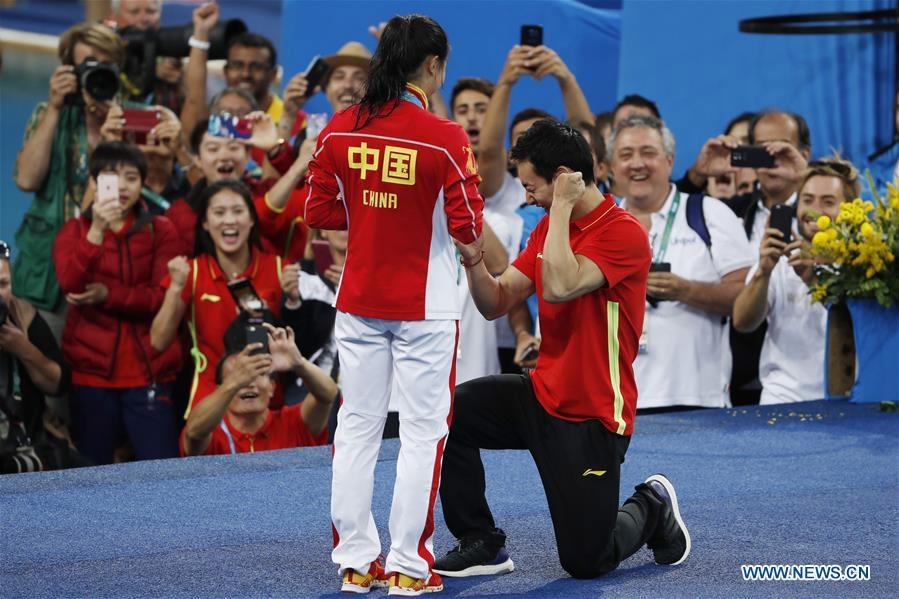
Silver medalist China's He Zi (L), receives a marriage proposal from Olympic diver Qin Kai after the awarding ceremony for the Women's diving 3m Springboard Final at the Rio 2016 Olympic Games in Rio de Janeiro, Brazil, August 14, 2016. /Xinhua Photo
Silver medalist China's He Zi (L), receives a marriage proposal from Olympic diver Qin Kai after the awarding ceremony for the Women's diving 3m Springboard Final at the Rio 2016 Olympic Games in Rio de Janeiro, Brazil, August 14, 2016. /Xinhua Photo
A
2015 study by scientists from Michigan State University (MSU) found that opting for whoever is available is a "better evolutionary strategy" than waiting for Godot, as humans are naturally risk-averse when it comes to relationships.
The researchers argued that primitive humans who took the safe bet, even if that meant inferior companions, gave them an "evolutionary advantage, if living in a small group," Science Daily quoted Chris Adami, professor of microbiology and molecular genetics at MSU and co-author of the paper, as saying.
"If they chose to wait, they risk never mating," Adami noted.
What makes a marriage work?
A high tolerance threshold and willingness to reach common ground are necessary to keep the promise of “till death do us part”, Sichuan Daily maintained.
While there’s no set formula for what makes a relationship last, social scientists have attempted to find key ingredients for a successful recipe:
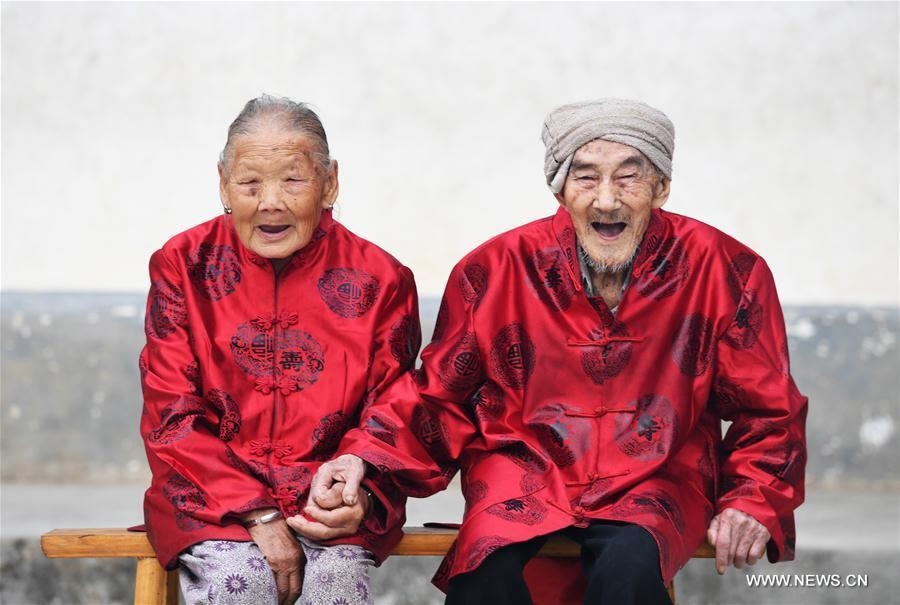
100-year-old Xiang Yongshan (R) and his wife Wu Xi’An,101, have been married for 81 years. /Xinhua Photo
100-year-old Xiang Yongshan (R) and his wife Wu Xi’An,101, have been married for 81 years. /Xinhua Photo
Saying “thank you”
No relationship is complete without the saccharine "I love you" declaration every once in a while. But to these three words scientists at
Georgia University have added two more: Thank you. Their 2016 study found that showing appreciation can predict the levels of happiness in a marriage, as it helps counter the fallout from arguments.
Synchronizing happiness
Offering the other a crying shoulder and giving comforting hugs go a long way in a relationship –
making or breaking a marriage could be down to the response one receives when sharing good news. Being sensitive to the other’s positive emotions increases the partner’s satisfaction in the relationship as it indicates they are valued and understood and reflects a sense of unity among the couple.
Turning a blind eye on the other’s flaws
Accepting the other for who they are, including their shortcomings, has a direct effect on marital satisfaction.
Psychologists at New Jersey-based Rutgers University found that those who embrace their partner’s irritating habits, such as drinking milk right from the carton, leaving hair in the sink or not putting the toilet seat down, can boost a couple’s chances of staying together. "Our findings indicate resilience may be one of the key predictors of marital satisfaction," lead author James Bradley told Reader’s Digest.
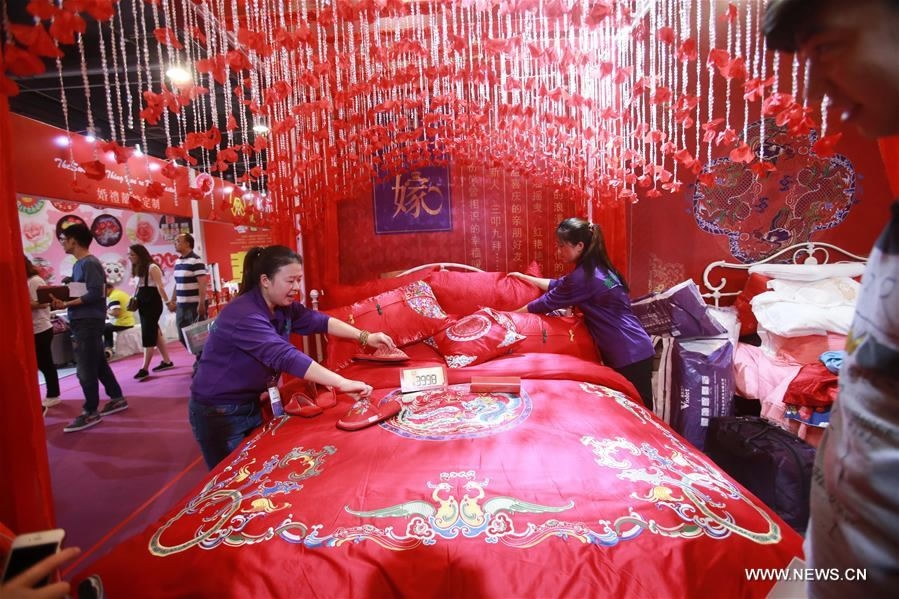
Staff member arranges beds for wedding room during a wedding expo in Beijing, capital of China, June 3, 2017. /Xinhua Photo
Staff member arranges beds for wedding room during a wedding expo in Beijing, capital of China, June 3, 2017. /Xinhua Photo
Using plural pronouns
There might be an "I" in marriage, but it’s the frequent use of "we" that increases the sense of satisfaction in a relationship.
One study found those using couple-focused pronouns, such as "we, our, us" feel happier in their union than couples who use "I, me and you". Collective pronouns have proven to be effective in mitigating the negative effects of fights.
Toasting together
Married couples who drink together, stay together – at least that’s the conclusion
one study has reached. Concordant drinkers report feeling less negative about the quality of their marriage over time than other couples. Researchers did not explain why such correlation exists, but argued it supports the theory that couples who engage in activities together tend to express more feelings of happiness.

